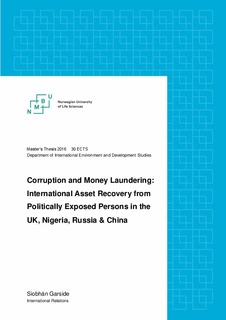| dc.contributor.advisor | Kjosavik, Darley Jose | |
| dc.contributor.author | Garside, Siobhan Michelle | |
| dc.date.accessioned | 2017-05-23T09:12:58Z | |
| dc.date.available | 2017-05-23T09:12:58Z | |
| dc.date.issued | 2016 | |
| dc.identifier.uri | http://hdl.handle.net/11250/2443256 | |
| dc.description.abstract | Corruption and Money Laundering is a global problem which has devastating effects on society. The aim of this study was to research Corruption and Money Laundering in four countries - the UK, Nigeria, Russia and China. Each country was researched through secondary sources as case-studies structured by three research questions focusing on asset recovery from Politically Exposed Persons (PEPs). These case studies examined current asset recovery efforts, planned changes to legislation and international co-operation efforts.
My comparative analysis reflected on theories connected to Marxism and Critical Theory as well as theories connected to institutions, regimes and laws. The analysis found that one of the key issues connected to anti-corruption and anti-money laundering (AML) efforts is that different countries have different norms and value systems meaning that laws and regulations may be interpreted differently. The analysis also found that each of the four countries display hegemonic relationships within domestic and international anti-corruption and AML efforts.
My discussion of these efforts reflected further on the case studies and the mechanisms used in international and domestic asset recovery. Legislative developments found that one of the most useful legislative tools for international asset recovery is Mutual Legal Assistance (MLA). Institutional developments highlighted how agencies such as Financial Investigation Units (FIUs) are useful institutions which enable information sharing between the public and private sectors. Policy developments discussed the anti-corruption drives indicating that in the cases of Russia, China and to some extent Nigeria concerns have been raised surrounding the lack of transparency.
It was possible to conclude that whilst each of the four countries are adapting their laws and making attempts to work with the international community to strengthen their asset recovery regimes, the extent to which these attempts have translated into success has been varied. | nb_NO |
| dc.language.iso | eng | nb_NO |
| dc.publisher | Norwegian University of Life Sciences, Ås | nb_NO |
| dc.rights | Navngivelse 4.0 Internasjonal | * |
| dc.rights.uri | http://creativecommons.org/licenses/by/4.0/deed.no | * |
| dc.subject | Money Laundering | nb_NO |
| dc.subject | Corruption | nb_NO |
| dc.subject | Nigeria | nb_NO |
| dc.subject | Russia | nb_NO |
| dc.subject | United Kingdom | nb_NO |
| dc.subject | China | nb_NO |
| dc.subject | Politically Exposed Persons | nb_NO |
| dc.subject | PEPs | nb_NO |
| dc.subject | Asset Recovery | nb_NO |
| dc.subject | Anti-Money Laundering | nb_NO |
| dc.subject | AML | nb_NO |
| dc.title | Corruption and money laundering : international asset recovery from politically exposed persons in the UK, Nigeria, Russia and China | nb_NO |
| dc.type | Master thesis | nb_NO |
| dc.subject.nsi | See next page for info | nb_NO |
| dc.source.pagenumber | 72 | nb_NO |
| dc.description.localcode | M-IR | nb_NO |

